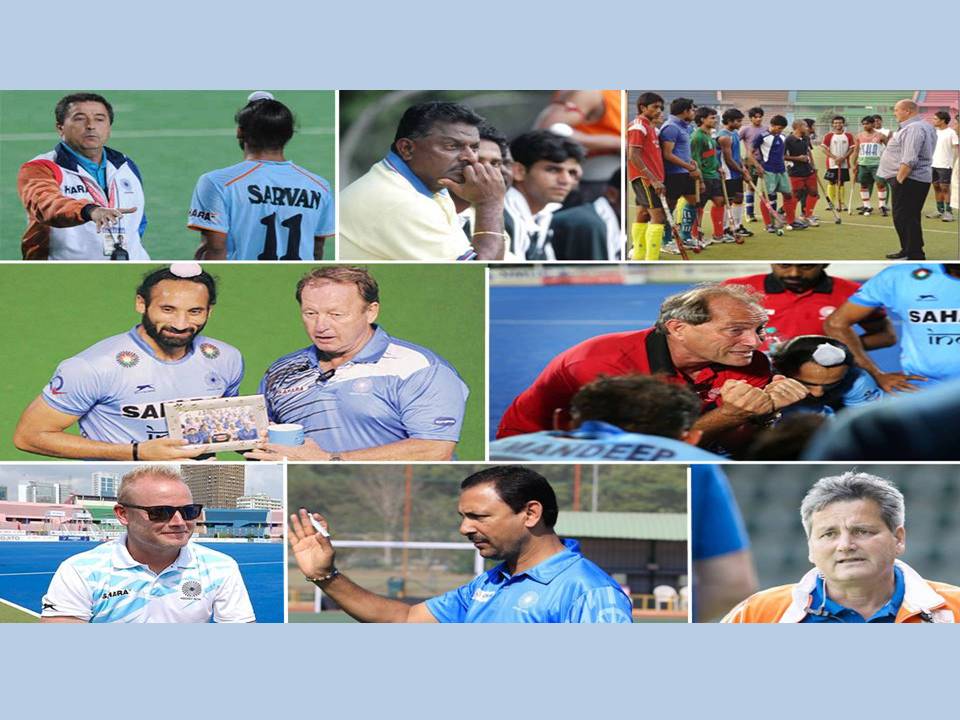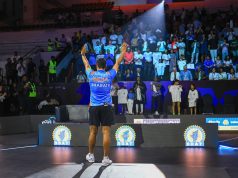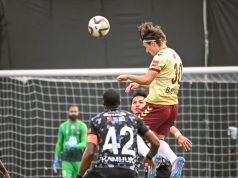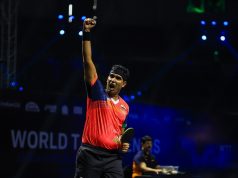Graham Reid, the Olympic medal-winner former Australian player, is the latest entrant in the Indian Hockey scenario. Reid has been appointed as the new chief coach of the India Men’s Hockey team. Reid has been handed a contract till the end of 2020, which can be extended depending on his performances with the team. But the Australian’s biggest desire is to have a ‘stable environment’ for himself as well as his players.
Graham Reid has hit the bull’s eye. The ‘stable environment’ has been clearly missing in Indian Hockey for the last two decades. If we look at the list of last 20 years there have been almost the same number of coaches who have been ‘hired’ with much fanfare but later ‘fired’ on lack of performance. This ‘hire and fire’ policy of Hockey India has often happened either in the midst of a major tournament or when the team is busy preparing for an important competition.
Let us look back to some of the famous entries and exists of Hockey India coaches:
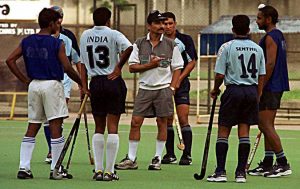
Cedric D’souza (February 2001- March 2002)
The much recognized Cedric D’Souza was selected at the helm of Indian Hockey in 2001, almost five years after his stint in 1996. Considered to be a shrewd tactician, D’Souza concentrated on defense without losing the teams’ attacking flair. He worked with the team to make them ready for the World Cup in 2002. D’Souza said in an interview that he had tried to break down the barrier between seniors and juniors, north and south. India was considered to be a favourite to win the World Cup but early bad games led to the end of Cedric D’souza. The President of Indian Hockey Federation, KPS Gill declared that D’Souza had been ‘rested’ and henceforth was asked to come back in the midst of the World Cup. His assistant, CR Kumar, was asked to take over for rest of the tournament.
Rajinder Singh Sr (April 2002-July 2004)
A member of India’s Moscow Olympics gold medal-winning team and coach of the 2001 Junior World Cup-winning team, Rajinder Singh was appointed the head coach after CR Kumar declined to take up the job. Singh’s tenure was a successful one as he won the Asia Cup in 2003 and also developed a good rapport with senior players. The team was gearing up for the 2004 Olympics by finishing a creditable second in the four-nation tournament in Dusseldorf. But the President, KPS Gill again played his part and fired him 27 days before the 2004 Olympic Games, citing unknown reasons. The sacking caused a huge uproar in the Hockey community and the media as well. The sources said the decision to sack Rajinder was taken by Gill after consultations with the selectors and panel of coaches. Assistant coach Gerhard Rach was elevated to the post of the head coach.
Gerhard Rach (August 2004-January 2005)
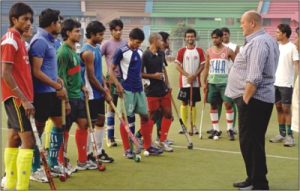
Gerhard Rach became the first foreign coach of the Indian team after he was appointed to the top job just a few days before the Athens Olympics. But his five-month stint was surrounded by controversies. During the Olympics the players blamed him for their defensive style of playing as against their natural attacking style. Rach stubbornly replied that in other countries such players would have been asked to go home right in the middle of a tournament. He even gave Dhanraj Pillay just 3 minutes in the India’s final match at the Olympic Games. His dubious past also added to the controversies. Rach spent 8 months in jail for fraud and tax evasion of 15 million Deutsche Mark. He also had 30 criminal cases against him. Mired by controversy, Gerhard Rach also had poor performance in the post-Olympics tournament. India finished fourth in Champions Trophy, losing to Pakistan in the bronze medal play-off, followed by a humiliating loss to minnows France at home. Ultimately, Rach declared that he was not fitting into the scheme of IHF and was ready to resign.
Rajinder Singh Jr. (April 2005-March 2006)
As Gerhard Rach’s controversial episode came to an end in January 2005, the IHF took some months before selecting the next coach. In April 2005, Rajinder Singh Jr. was given charge of the Indian team a month before Sultan Azlan Shah Tournament. Rajinder was a member of Indian team that finished runners-up in the 1982 Asian Games in New Delhi. He also represented India at the 1984 Los Angeles Olympics. But he did not have a good tenure as a coach. Indian team lost all the 5 tournaments played under him. Indian team finished 5th in Sultan Azlan Shah Cup, 7th in Mini World Cup and last in Champions trophy. Eventually, he faced the axe though he himself claimed that he resigned from the post due to the ‘dictatorship’ and ‘divide and rule’ policy of IHF.
Vasudevan Baskaran (April 2006- March2007)
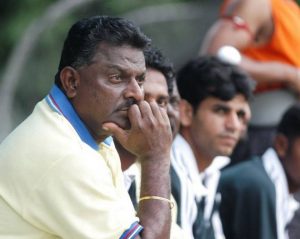
As a player, V Baskaran won the Olympic gold in 1980, but as a coach he was mediocre. In April 2006 he was hired as coach of Indian national team for the 4th time. But during his tenure, it was for the first time that the Indian team did not medal in Asian Games. Baskaran did mistakes before the Asian Games- firstly, he removed captain Viren Rasquinha from the team and also did not pick Gagan Ajit Singh for the team. Meanwhile, Baskaran was also having a strained relationship with his deputy Harendra Singh. Following his dismal Asian Games performance, the IHF decided to fire Baskaran for the 4th time and handed the post to another Olympian Joaquim Carvalho.
Joaquim Carvalho (March 2007- March 2008)
Former national player, Joaquim Carvalho, was brought in as the chief coach of Indian hockey team after the Asian Games debacle. The initial days were quite sunny for Carvalho as the team won bronze medal in Sultan Azlan Shah Cup of 2007 and gold in 2007 Asia Cup under his coaching. But what stood against him was India’s non-qualification to the Olympic Games for the first time in 80 years. Authorities accused him of choosing the wrong team without Arjun Halappa and Sandeep Singh. Also when India’s lone penalty corner expert Diwakar Ram was injured, he was replaced by a forward instead of a penalty corner expert. Following India’s 0-2 loss to Great Britain in the final of the Olympic qualifying tournament, Carvalho admitted that his failure to deliver result prompted him to resign.
Maharaj Kishan Kaushik (September 2008- April 2009)
2008 was perhaps the worst year for Indian hockey in recent times. After Joaquim Carvalho’s exit, IHF vice-president Narendra Batra voluntarily resigned. Australian great, Ric Charlesworth, was suddenly appointed the Technical Advisor and expert coach of the Men’s team. But bribe scandal and other administrative difficulties led to the exit of Charlesworth who resigned from his post citing failure to get his salary arrears cleared. With no coach for Men’s team, the ad-hoc committee suddenly gave the charge to Women’s team coach Maharaj Kishan Kaushik. The ex-Olympian was back as coach of India’s Men’s hockey team, ten years after guiding to the gold medal at the 1998 Bangkok Asian Games. But basically, Kaushik was a makeshift option who soon paved way to the more decorated Spaniard coach Jose Brasa.
Jose Brasa (May 2009 to November 2010)
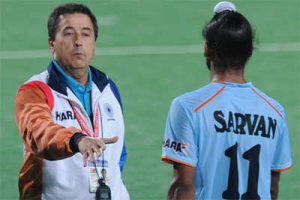
Jose Brasa took over the reins at a tricky time but did wonders with the team. He guided India to win a silver medal for the first time in the Commonwealth Games and a bronze at Guangzhou Asian Games. Brasa was given an initial contract till 2010 Asian Games and was expected to oversee till the 2012 Olympics campaign. But when the Indian team failed to qualify for the Olympics directly, Brasa’s contract was not extended. It is often discussed that Brasa was shown the door not because he failed to make it directly to the Olympics, but his assertive nature did not go down well with the authorities.
Michael Nobbs (June 2011 to June 2013)
Australian Michael Nobbs helped India seal a berth in the 2012 London Olympics. But when India finished at the bottom in London, his credentials started being questioned. The Australian again came under scrutiny after India failed to book a direct ticket for the World Cup in Netherlands, finishing sixth out of eight teams in FIH World League Semifinal. Nobbs was initially offered a five-year contract and a handsome salary, but his association with Indian hockey lasted merely two years. He was sacked by the authorities who realised that Nobbs was a wrong choice.
Terry Walsh (October 2013 to October 2014)
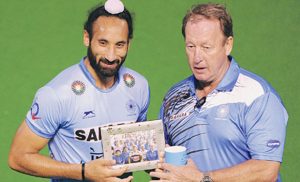
After Michael Nobbs exit, his fellow countryman Terry Walsh was appointed the coach of Indian Hockey. Terry had a dream run with the team as he helped India bag the Asian Games gold after a gap of 16 years. As a result, India qualified automatically for the 2016 Rio Olympics. It was expected that Terry would continue till the Olympics. But stifled by ‘bureaucratic confines, the Australian was finding considerable difficulty in adjusting to the decision making style of the authorities. So, after completing his first year, Walsh decided to quit and returned to Australia in 2014.
Paul van Ass (January 2015 to June 2015)
Paul Van Ass’s succession to the throne was expected to be a smooth one. But less than six months after his appointment, things started to turn bitter. Ass reported that during the World Hockey League Semifinals in Belgium, the coach had an argument with then Hockey India president Narinder Batra after the latter reportedly entered the playing field and questioned the players over the dismal show. After that, the Dutch expert left for his country, not joining the national camp at Shilaroo leaving the Rio preparations midway.
Roelant Oltmans (August 2015 to Sep 2017)
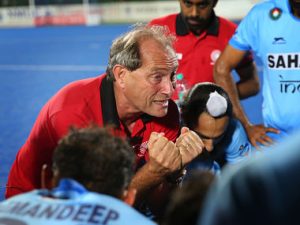 Roelant Oltmans was appointed the high performance director of Indian Hockey in 2013. When Terry Walsh had resigned from his post, HI put Oltmans in charge on a temporary basis. As an interim coach, Oltmans took India to the last four stage in the Champions Trophy. But he was relieved from the duty as HI named Paul van Ass of Netherlands as coach on a long-term basis. Just months into the job, Ass resigned and Oltmas was then asked to take over the Men’s team as head coach till the 2016 Rio Olympics. Under him, India had a remarkable outing in the Hockey World League. They clinched the bronze medal by defeating Netherlands in penalty shootout. He also guided India to the final of the Sultan Azlan Shah Cup where they lost to Australia. At the Rio Olympics, India qualified for the quarter-finals where they lost to eventual silver medallists Belgium. Next, the team won the Asian Champions Trophy in Malaysia. But suddenly the tables turned as India finished a disappointing sixth in the Hockey World League Semifinal. Oltmans was severely criticised after his team suffered losses against lower-ranked sides like Malaysia and Canada. The success of Oltmas was overlooked and he was sacked. While leaving, Oltmas lamented, “When I took up the offer, I knew someday I will be sacked but I was ready for that.”
Roelant Oltmans was appointed the high performance director of Indian Hockey in 2013. When Terry Walsh had resigned from his post, HI put Oltmans in charge on a temporary basis. As an interim coach, Oltmans took India to the last four stage in the Champions Trophy. But he was relieved from the duty as HI named Paul van Ass of Netherlands as coach on a long-term basis. Just months into the job, Ass resigned and Oltmas was then asked to take over the Men’s team as head coach till the 2016 Rio Olympics. Under him, India had a remarkable outing in the Hockey World League. They clinched the bronze medal by defeating Netherlands in penalty shootout. He also guided India to the final of the Sultan Azlan Shah Cup where they lost to Australia. At the Rio Olympics, India qualified for the quarter-finals where they lost to eventual silver medallists Belgium. Next, the team won the Asian Champions Trophy in Malaysia. But suddenly the tables turned as India finished a disappointing sixth in the Hockey World League Semifinal. Oltmans was severely criticised after his team suffered losses against lower-ranked sides like Malaysia and Canada. The success of Oltmas was overlooked and he was sacked. While leaving, Oltmas lamented, “When I took up the offer, I knew someday I will be sacked but I was ready for that.”
Sjoerd Marijne (Sep 2017 to May 2018)
Roelant Oltmans was asked to step aside by HI without any prior plan of who would be the next. So hurriedly, Sjoerd Marijne, the Women’s national team coach, was appointed the coach of the Men’s team. Sjoerd was a man who had no previous experience of coaching a Men’s national side. But he gave his best to steer the team in the right direction. India had an undefeated campaign at the Asia Cup, a good run at the Hockey World League Final in Bhubaneshwar and a successful test series against New Zealand. But disappointment came at the Sultan Azlan Shah Cup and the no-medal show at Gold Coast Commonwealth Games. Marijne was charged of inconsistency and was pushed again to his former place and Harendra Singh was handed over the reins.
Harendra Singh (May 2018- January 2019)
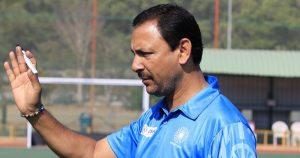 When Harendra Singh was expected to take over as chief coach, he was not given the job. Instead he was made the in-charge of the Women’s team and Sjoerd Marijne took over the Men’s team. But again HI swapped the chief coaches of the Men’s and Women’s teams after the disaster in 2018 Commonwealth Games. Harendra, who had won the Junior World Cup, had many plans for the national team. But a rough 2018, forced him to go back to the junior squad. Under Singh, India were below-par in the Asian Games in Indonesia and ended the year with a quarterfinal loss in the World Cup. HI decided to reassign Harendra the job of the junior team in order to build a strong base ahead of 2021 Junior World Cup.
When Harendra Singh was expected to take over as chief coach, he was not given the job. Instead he was made the in-charge of the Women’s team and Sjoerd Marijne took over the Men’s team. But again HI swapped the chief coaches of the Men’s and Women’s teams after the disaster in 2018 Commonwealth Games. Harendra, who had won the Junior World Cup, had many plans for the national team. But a rough 2018, forced him to go back to the junior squad. Under Singh, India were below-par in the Asian Games in Indonesia and ended the year with a quarterfinal loss in the World Cup. HI decided to reassign Harendra the job of the junior team in order to build a strong base ahead of 2021 Junior World Cup.

